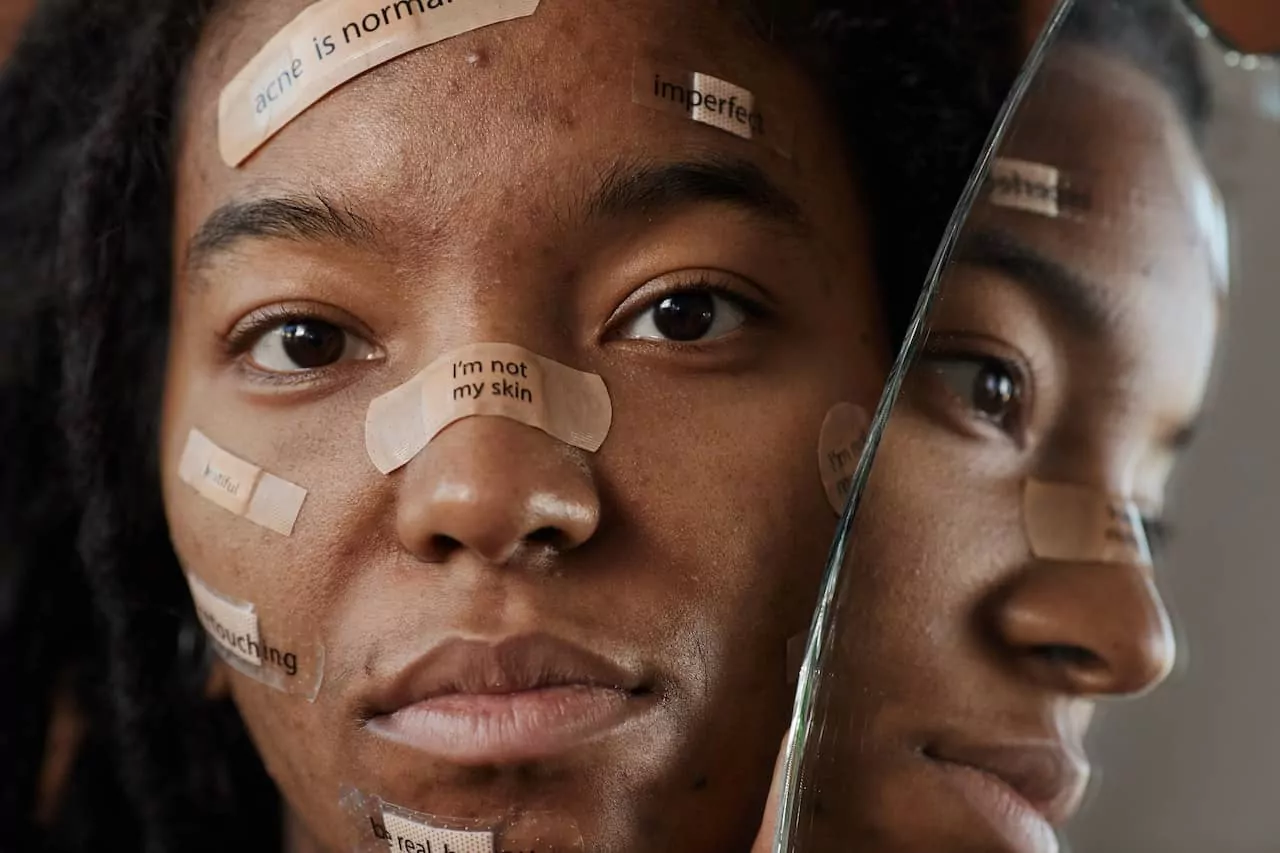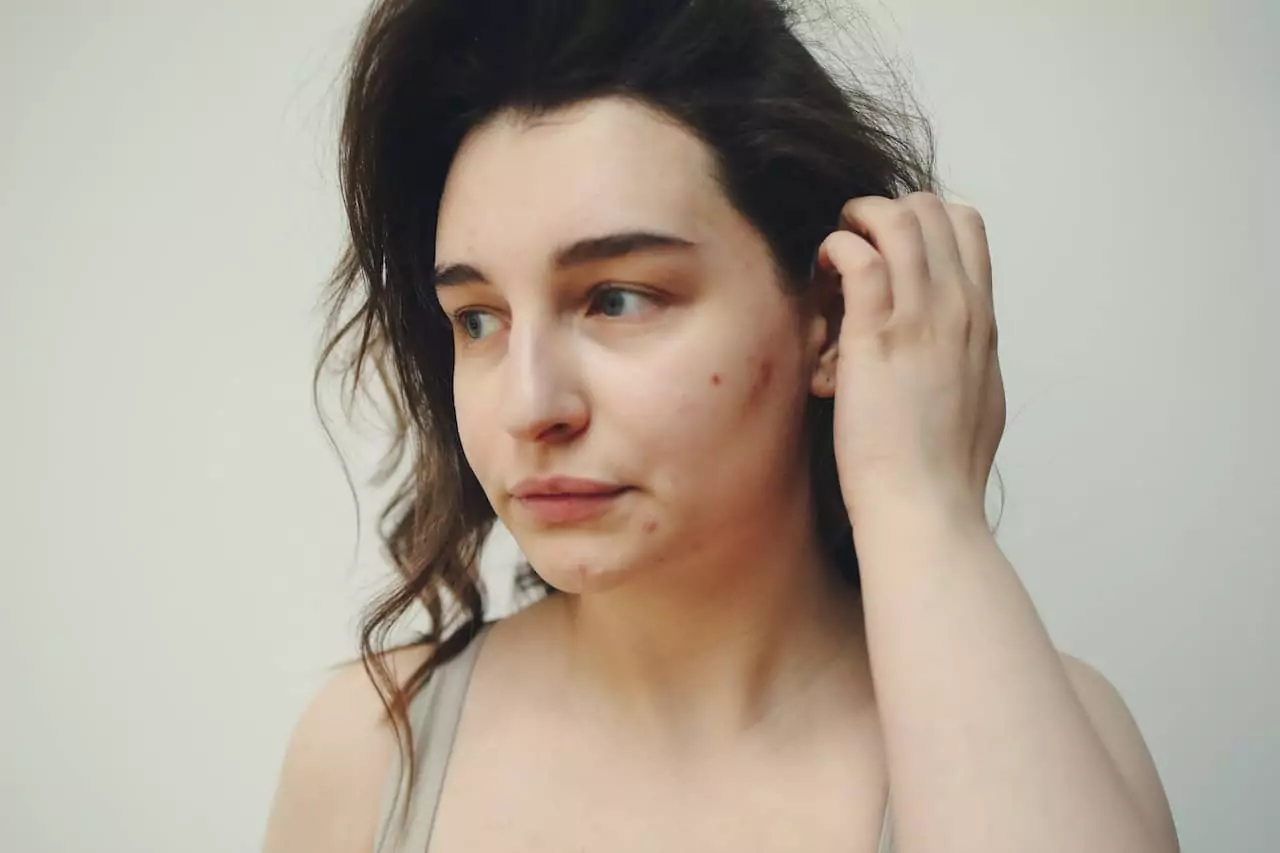Hormonal acne can cause long-term frustration in terms of your skin. Find here the main causes and the best natural hormonal acne treatment.
Acne is considered a teenage problem. However, many adults struggle with pimples and blackheads on the skin. In such cases, the so-called "hormonal acne" occurs. In the article, we`re going to find out what causes it and how to stop hormonal acne.
Hormonal acne is a type of skin disease that implies the emergence of pimples, blackheads, and rash. Hormonal disorders are associated with diseases of the ovaries or adrenal glands. It appears as a result of excess sebum production.
They distinguish between bacterial and hormonal acne. When talking about hormonal type, its cause is hidden inside the human body, that is, hormonal acne is caused by dysfunction of some organs (adrenal glands, ovaries, etc.). The skin sharply reacts to all changes in organism functioning, signaling by acne, that is, excess sebum is produced, and pores are clogged.
Bacterial acne is related to an external factor. In this case, bacteria settle on the skin surface and cause skin damage and inflammation.
The cause of this type of acne is a hormonal imbalance, as a result of which an excess of hormones is produced or, conversely, their deficiency occurs. Hormonal hypersensitivity of some organs is also possible. This problem is related to male and female hormones. An imbalance of their secretion can lead to an increase in the work of the sebaceous glands. Excess sebum is an excellent breeding ground for Propionibacterium acne bacteria, which are responsible for acne.
Besides, other hormonal acne causes can be poor personal hygiene, inadequate nutrition, exposure to chronic stress, and improper skin care.
There are two groups of hormones:
By nature, the female and male body has both types of hormones. But, woman body has a higher level of estrogen, while men have more androgens. With an imbalance, the proportions change, and problems with health and appearance arise. Here`s a list of the main hormones that cause acne:
Only a doctor can determine which of the hormones is in excess, and which one is deficient.
First of all, note that any skin problem is treated as a complex therapy of internal and external care. Thus, it is important to combine proper nutrition with the required nutrients and add regular skincare with appropriate products.
Unlike juvenile acne, hormonal acne causes milder symptoms but is chronic and therefore more difficult to treat. The treatment for hormonal acne must last at least several months to achieve a noticeable effect.
Depending on the symptoms and their severity, a dermatologist may recommend treatment with creams, ointments, or gels based on benzoyl peroxide or adapalene. It is often necessary to pass antibiotic therapy. If the disease is severe, systemic treatment based on antibiotics and retinoids is introduced.
In addition to pharmacotherapy, it is also important to care for acne-prone skin properly. The best skincare for hormonal acne includes regular cleansing to remove dead skin cells, accumulated dirt, and bacteria. Dermo cosmetics designed for sensitive and oily skin and products with exfoliating, antibacterial, and anti-seborrheic properties are a good choice. After cleansing, the skin must be moisturized.
When trying to find ways on how to get rid of hormonal acne, you can use herbal infusions of nettle leaf, horsetail, tricolor violet, and willow grass with small flowers. These herbs improve metabolic processes and regulate the secretion of sebum.

In trying to find the best remedy for the skin problem, note that regular control of skin condition is required. Answering the question "How to cure hormonal acne", be ready to make a daily examination of your skin surface. Once the treatment strategy is appointed, regular visits to a dermatologist are also needed.
Dermoi is a reputable group of enthusiasts that put their knowledge and expertise together to help people pick the most suitable skincare products for their problems. The team consists of cosmetologists, dermatologists, chemists, and doctors, who are well-versed in skincare issues. Our task is to compile trusted lists of the best skin care products for hormonal acne. To cope with this task, we do the following:
We guarantee that all the products provided in our rating are safe, 100% effective, and high-quality. Their contents are certified and clinically proven.
Care cosmetics for problem skin should contain a number of active ingredients that will help normalize cell function and saturate them with all the necessary nutritional ingredients. The composition should contain sebum-regulating components. These are active compounds that reduce sebum production and make the skin less oily.
The best products for hormonal acne should contain calming, anti-bacterial, and anti-inflammatory ingredients to soothe the skin, prevent bacteria growth, reduce irritation and redness, and create a protective layer on the surface.
Here`s a list of dermatologist-recommended supplements for hormonal acne:
The benefit and effectiveness of these supplements for hormonal acne are clinically proven.

The main reason for jawline hormonal acne is that a lot of bacteria, in particular propionobacteria acne, normally "live" in our skin. The peculiarity of these microorganisms is that they lead an anaerobic lifestyle, that is, they do not need air access. Moreover, oxygen is poison for them. Ideal conditions for acne bacteria - lack of air with abundant nutrition - are created in a comedone. Thus, they begin to actively multiply, and their metabolic products provoke the development of an inflammatory reaction. As a result,jawline acne hormonal imbalance leads to the transformation of a harmless blackhead into a pimple and inflammation.
Now, let`s see how to get rid of chin acne hormonal. The process implies a proper daily skincare routine. As a cosmetic hormonal chin acne treatment, products based on proven ingredients are usually used:
As for cosmetics, different categories of products are recommended.
Besides, some cosmetology procedures are carried out for coping with hormonal acne on the chin. These are:
Here is a list of vitamins to take for hormonal acne:
Only a doctor can appoint a vitamin complex for vitamins for hormonal acne. An uncontrollable consumption of hormonal acne vitamins can lead to even more rashes, redness, and peeling.
To get rid of acne, you need to reduce the skin greasiness and contribute to the narrowing of the sebaceous glands. Thus, balanced nutrition comes as an essential step of a hormonal acne skincare routine.
The diet for acne is largely aimed at reducing the consumption of fats and sugar, as well as increasing the consumption of fiber. This leads to the normalization of digestion and a significant improvement in the condition of the skin and body. In addition, properly selected foods and regular meals improve the immune system, which helps the body to fight against skin inflammation and other diseases.
The acne diet implies the rejection of all foods that increase the level of glucose and cholesterol in the blood, as well as those dishes that can enhance the work of the sebaceous and sweat glands. So, it is recommended to exclude from the diet:
When trying to cope with hormonal imbalance acne, make sure to add the following dishes to the diet:
Note that the best hormonal acne treatment to achieve a noticeable effect is a complex of skincare, proper nutrition, and a healthy lifestyle, including good sleep.

It lasts until you normalize your inner health and balance hormone functioning. If you do nothing, it won`t go as it is, the situation will only get worse. Moreover, make sure to start proper skincare for hormonal acne as fast as you can.
Yes, it is the most common cause of hormonal acne.
You should visit a dermatologist and pass an examination. Only a specialist can conclude the type of acne.
Yes, dairy is on the list of forbidden products for people who suffer from acne skin disease.
The issue is tricky with gluten since some products are not allowed, while others act favorably on acne symptoms. Thus, it is impossible to say definitively whether it influences the development of acne. Moreover, very few studies have been conducted to prove their interconnection. In most cases, gluten does not cause a decisive role in acne emergence.
Yes, sugar and sweets are one of the first foods to be forbidden and limited during acne treatment.